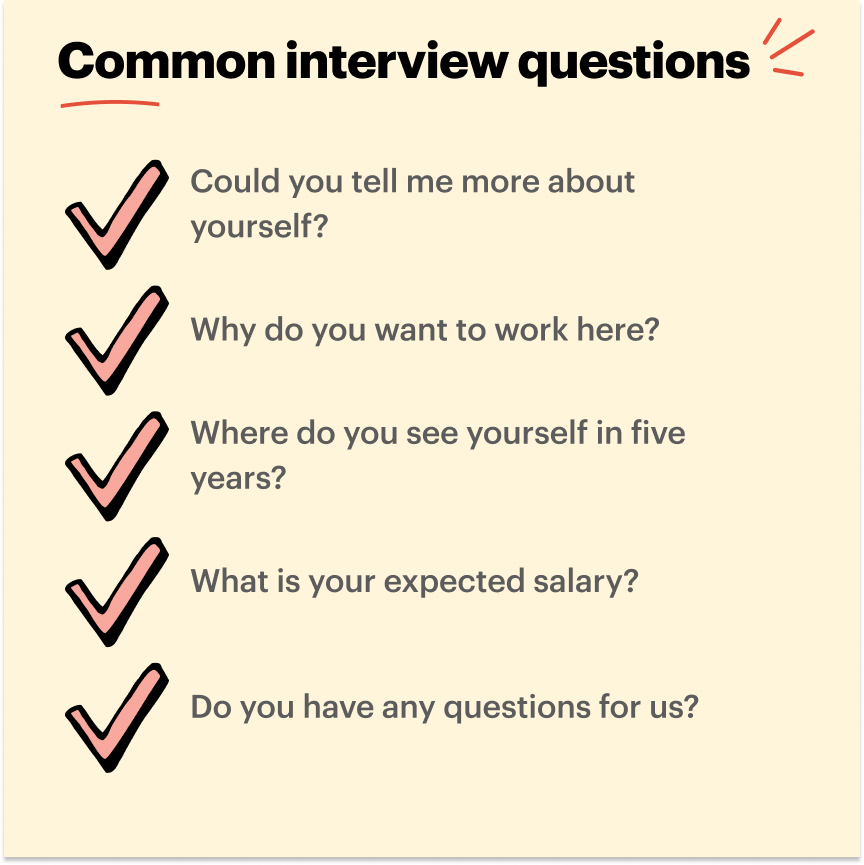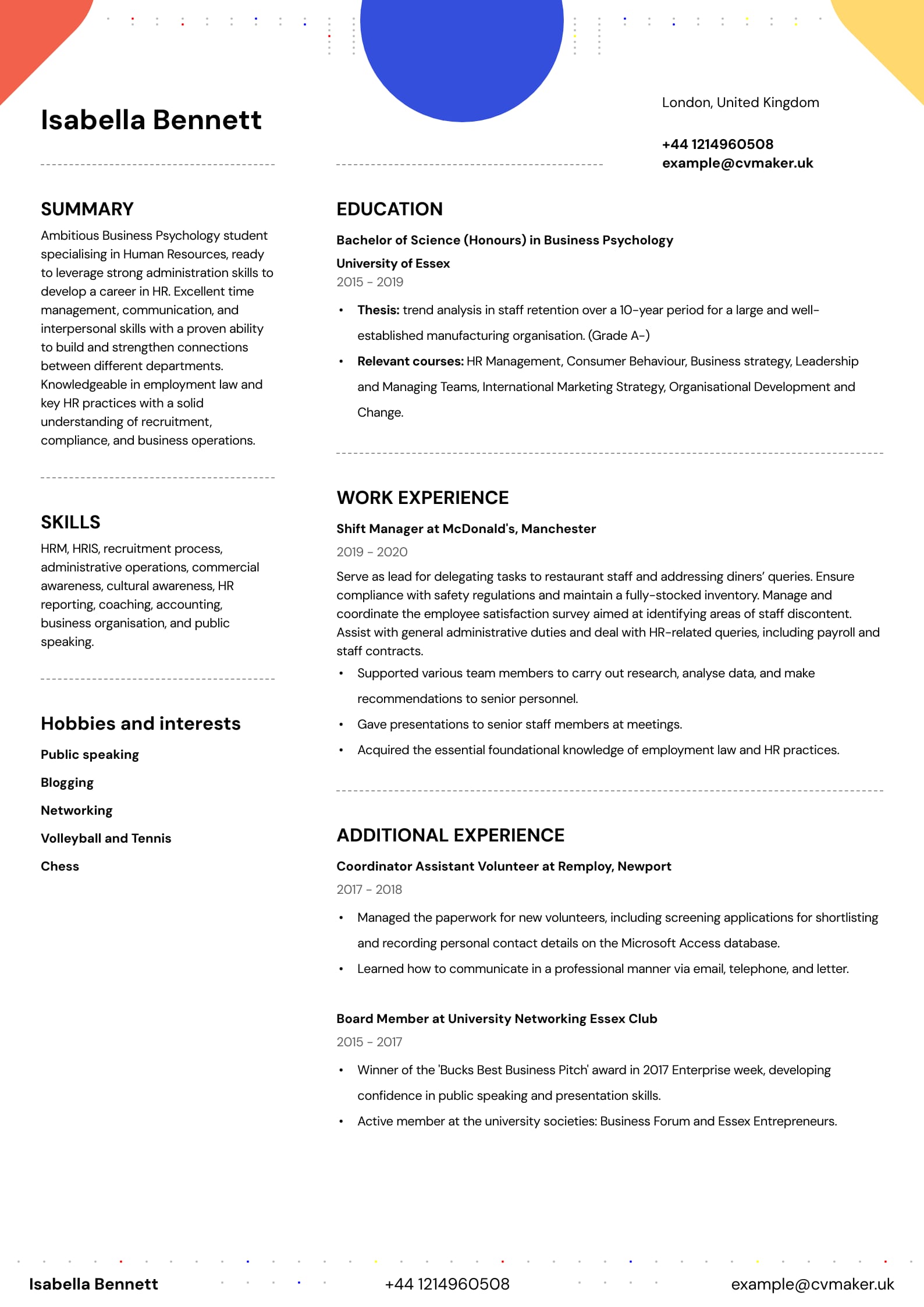Job interviews can be nerve-wracking experiences, but with proper preparation, you can approach them with confidence. As AI tools like Interview Warmup or HireVue become more prevalent, companies are adopting new strategies to screen candidates and identify the right talent. While this helps automate the hiring process, it also raises concerns about potential biases in AI algorithms and a lack of personal touch in answers.
In the UK job market, certain questions arise across various industries and roles. By learning these common interview questions, you would be better prepared to demonstrate your skills and experience for the job.
In this article, we cover:
Most common questions and sample answers.
Tips on how to tailor your responses to various jobs and the biggest industries in the UK.
Best job interview preparation strategies.
How to answer them with little to no experience.
What are the common interview questions
No matter the industry or job you're applying for, it's important to know the types of questions you may face. The goal of these questions is to see if you are a good fit for the role. Recruiters want to learn about your skills, and how you can help the team the team and company culture.

Common categories of interview questions include:
Behavioural questions: These ask you to share specific experiences or examples of situations you have been through.
Situational questions: These present hypothetical scenarios relevant to the role, testing your problem-solving skills and problem-solving.
Technical questions: Depending on the job, you might be asked questions about your technical knowledge or skills needed for the position.
General questions: These typically focus on your relevant experience, reasons for applying, and career goals.
How to answer common interview questions with no experience
Research the company: Learn about the company's values, mission, and recent projects. This helps you tailor your answers and show your genuine interest in the job.
Rehearse your responses: Go over the most frequent questions to build confidence. Try rehearsing with a friend or in front of a mirror to refine your delivery and reduce stress.
Apply the STAR interview method: For behavioural questions, try using the STAR method to clearly share your experiences.
Stay calm: Feeling nervous is normal, but remember an interview is just a conversation. Take deep breaths, maintain eye contact, and stay engaged throughout the process.
For more examples and tips, refer to our related blog article on the best interview tips for introverts.
Create a professional CV today
Effortlessly create a modern CV
Easy to edit in the CV builder
Integrated spelling and grammar check
Customisable job-specific CV examples

Improve your job chances with CVMaker, the ultimate career platform. We provide a vast collection of CV templates tailored to your job and experience.
Top 10 common interview questions and how to answer them
Could you tell me more about yourself?
Correct answer:
Situation: I am a dedicated healthcare professional with three years of experience in NHS settings.
Task: My focus has been on improving patient care and providing administrative support.
Action: I have developed strong organisational skills by managing patient records and coordinating schedules for medical staff.
Result: My contributions have enhanced the efficiency of our department, allowing us to serve more patients effectively.
Incorrect answer:
I graduated last year and have been looking for a job since. I don't have much experience, but I’m eager to learn and think I’d do well in this role.
Explore more tricks for answering the ‘tell me about yourself’ interview question in our blog article, where we share expert advice and examples to help you craft a compelling response. And for more healthcare related tips and guidance, don’t miss our article on common NHS interview questions.
Why do you want to work here?
Correct answer:
Situation: I have followed your company’s innovative approach to business technology.
Task: I am excited about the prospect of contributing to your projects that drive efficiency and growth.
Action: My background as a Python Software Developer aligns well with your focus on developing cutting-edge solutions.
Result: I believe my skills can helo your team succeed, and I am eager to be part of a forward-thinking organisation.
Incorrect answer:
I just need a job and your company was one of the first I applied to. I don’t know much about what you do, but I’m sure it’s fine.
Where do you see yourself in five years?
Correct answer:
Situation: I aim to advance within the education sector.
Task: My goal is to take on a leadership role where I can influence curriculum development and mentor new teachers.
Action: This teaching position is a crucial step towards achieving that, as it will allow me to gain valuable experience and insights.
Result: I am excited about the possibility of shaping future educators while continuing to develop my own skills.
Incorrect answer:
Honestly, I haven’t thought that far ahead. I just want to do well in whatever job I get.
What is your expected salary?
Correct answer:
Situation: In my previous role in retail management, I gained experience that I believe is valuable to your company.
Task: Based on my research of similar roles in this region, I need to establish my salary expectations.
Action: I would expect a salary in the range of £25,000 to £30,000, considering my experience and the responsibilities of this position.
Result: I am open to discussing the entire compensation package, including benefits and opportunities for growth.
Incorrect answer:
I don’t really care about the salary as long as I get a job. Just pay me whatever you think is fair.
Check out our related articles on how to negotiate salaries to help with your salary negotiations.
Do you have any questions for us?
Correct answer:
Situation: I am genuinely interested in the role and company culture.
Task: I want to ensure that I understand how I can contribute effectively.
Action: I would like to ask what success looks like in this role and the opportunities for professional development within the company.
Result: Understanding these aspects will help me align my efforts with the company's goals and foster my own growth.
Incorrect answer:
No, I think I’ve covered everything. I just really want to get this job.
Be prepared to leave a lasting impression and review our top choices for good questions to ask in an interview.
Can you describe a challenging situation you faced at work?
Correct answer:
Situation: At my previous job as a customer service representative, we faced a sudden increase in customer complaints due to a system error.
Task: I needed to manage customer expectations while addressing the issue.
Action: I implemented a communication plan, informing customers of the situation and the steps we were taking to resolve it. I also coordinated with the IT team for updates.
Result: We resolved the issue within 24 hours, and customer satisfaction scores improved due to our proactive communication.
Incorrect answer:
I don’t really have any specific challenges. I usually get along with everyone and things go smoothly.
Read more about how to effectively include communication skills in your CV.
How do you handle stress and pressure?
Correct answer:
Situation: During a busy sales period at my last job, the pressure was intense as we had tight deadlines.
Task: I needed to maintain my performance while ensuring the team met our targets.
Action: I prioritised tasks using a clear schedule and delegated responsibilities to team members, ensuring we worked collaboratively.
Result: This approach not only helped us meet our targets but also improved team morale and efficiency.
Incorrect answer:
I tend to shut down when I get stressed. I just try to avoid high-pressure situations altogether.
Check out our related sales CV and sales cover letter for more insights on the entry requirements and more industry-specific examples.
Why are you leaving your current job?
Correct answer:
Situation: I have learned a great deal in my current role, but I am seeking new challenges.
Task: I want to find an opportunity that allows for professional growth and aligns more closely with my career goals.
Action: Your company’s focus on innovative projects and continuous learning is exactly what I’m looking for.
Result: I believe this position will help me grow my skills while contributing significantly to your team.
Incorrect answer:
I’m just tired of my current job and want to leave. The environment isn’t great, and I don’t see any opportunities for growth.
See our related blog article on what to do after being made redundant or how to get back to work after a career break.
What are your greatest strengths?
Correct answer:
Situation: One of my strengths is my ability to communicate effectively with diverse groups.
Task: In my last role as a project coordinator, I often needed to bridge gaps between technical teams and stakeholders.
Action: I developed clear reports and presentations that simplified complex concepts for non-technical audiences.
Result: This improved understanding and collaboration across departments, leading to smoother project execution.
Incorrect answer:
I’m just a hard worker. I usually get things done, but I don’t really have specific strengths.
What is your greatest weakness?
Correct answer:
Situation: I’ve struggled with time management, especially when handling multiple projects.
Task: Recognising this, I knew I had to improve to meet deadlines more effectively.
Action: I started using project management tools to track tasks and prioritise my workload more efficiently.
Result: This change has significantly improved my productivity and allowed me to meet deadlines consistently.
Incorrect answer:
I can be too honest sometimes, which can upset people. But I don’t really see it as a weakness.
For more tips, refer to our related blog article covering strengths and weaknesses questions in a job interview.
Common interview questions for freshers
When you’re new to the job market, interviewers want to know about your motivation, skills, and how you’d fit into their company. Here are a few examples:
Why did you choose this career path?
I’ve always been interested in marketing and love finding new ways to engage with people. During my degree, I led a social media project that increased engagement by 30%, and it made me realise I want to bring my skills and creativity to Bright Marketing Solutions.
What skills have you developed during your studies?
I’ve really sharpened my research and communication skills. For one project, I analysed market data and presented it to my class, which taught me how to clearly communicate insights—something I know will be useful in this role.
How do you handle feedback?
I see feedback as a way to grow. Once, after some critique on a presentation, I took the advice, improved my research, and delivered a much stronger presentation the next time.
For more examples and tips, check out our school leaver CV example and career advice for school leavers.
Common interview questions for teachers
Teaching interviews often focus on how you handle the classroom, adapt to students’ needs, and your overall passion for teaching. Here’s what to expect:
How do you manage classroom discipline?
I set clear rules and use positive reinforcement. For example, when one student kept interrupting lessons, I introduced a reward system for good behaviour, and it helped turn things around.
How do you adapt to different learning styles?
I mix up my approach with visual aids, group work, and hands-on activities. When I was teaching fractions, I used objects, visual models, and group discussions to make sure each student understood in their own way.
How do you assess progress?
I use a mix of quizzes, discussions, and projects. I recently ran a quick quiz and realised a few students needed extra help, so I adjusted my lessons to focus on those areas.
Refer to our teacher CV and teacher cover letter for more information on the entry requirements and ways to develop your career in the education sector.
Common interview questions for retail
Retail jobs are all about customer service, problem-solving, and working well with others. Here are some key questions you might face:
How would you deal with an unhappy customer?
First, I’d listen and show empathy. I’d offer them options to fix the issue, like a refund or an exchange. I had a similar situation where I managed to turn the experience around by making sure the customer felt heard and valued.
What would you do if a colleague wasn’t following store policies?
I’d have a private chat to see if they needed any help or clarification. One time, a colleague wasn’t scanning items properly at checkout, so I stepped in, explained the process, and offered some tips.
How do you prioritise tasks during busy periods?
I focus on the customers first. During a busy sale, I made sure to manage queues and keep things moving smoothly while also supporting my team when needed.
See our retail CV and retail cover letter guides for more insights on how to tailor your career documents to specific roles.
Common interview questions for accountants
Accounting interviews often test your eye for detail, how you handle tight deadlines and your technical know-how. Here are some common questions:
How do you make sure your work is accurate?
I always double-check my entries and use accounting software to verify figures. For example, when preparing a report, I cross-checked every figure to make sure it was spot-on.
How do you manage tight deadlines, especially during busy periods?
I break down tasks into smaller chunks and prioritise by urgency. During tax season, I focused on the most time-sensitive clients first, which kept everything on track.
What would you do if you found a discrepancy in the accounts?
I’d go back through the entries to find where the issue started. Recently, I noticed a discrepancy in a report and traced it back to a data entry mistake. I fixed it and made sure the correct figures were recorded.
For more tips on preparing for your interview, check out our related guide on how to write your accountant CV.
Key takeaways
Building your confidence is key to success. Be honest and positive in your responses, and treat each interview as an opportunity to learn and grow. Consider the following:
Thoroughly research the company and role.
Leverage AI tools to enhance your preparation.
Use the STAR method for behavioural and competency-based questions.
Practice with mock interviews and seek feedback.
Provide specific examples to illustrate your skills and experiences.
Ask thoughtful questions to ask the interviewer at the end of the interview.
Follow up with a thank-you email after the interview.
Having second thoughts about your upcoming interview? It's ok to cancel! Follow our tips on how to cancel an interview in a professional manner.
Next steps?
Now that you have answers to common questions and your STAR examples prepared, it’s time to gear up for your upcoming interview. Rehearse your answers with a friend to build confidence, and explore our tips for in-person, phone, and video formats.
Brush up on your skills with our tips for telephone interviews. Remember to update your LinkedIn profile to showcase your skills and experiences—this can help you stand out in your job search. Lastly, consider conducting a mock interview to familiarise yourself with the format and gather valuable feedback. Consider reading our tips on how to follow up after a job interview.
For more inspiration, check out our related blog articles as follows:
FAQs
What are the 7 most common interview questions and answers?
Could you tell me about yourself?
Why do you want this job?
What are your greatest strengths?
What are your weaknesses?
Why should we hire you?
Where do you see yourself in 5 years?
Do you have any questions for us?
How do I prepare for common interview questions?
Research the company and role thoroughly.
Practice your answers using the STAR method.
Prepare specific examples from your experience.
Conduct mock interviews with friends or family.
Review your CV and be prepared to discuss any aspect of it.
Prepare thoughtful questions to ask the interviewer.
What are common behavioural interview questions?
They often start with phrases like "Tell me about a time when..." or "Give me an example of..." These types of questions aim to understand how you have handled situations in your previous roles.
Describe a time when you had to work under pressure.
Tell me about a situation where you had to resolve a conflict with a colleague.
Give me an example of when you showed initiative at work.
How can AI help me prepare for interviews?
AI tools like Interview Warmup, Yoodli, and InterviewGPT offer personalised feedback and simulate interview scenarios, helping you refine your responses to common questions. Even though AI can generate answers, it's important to personalise them to avoid sounding robotic. Here are five effective prompts to consider:
"What are the soft and hard skills needed for [specific job title]?"
"How should I answer 'Why do you want to work here?' for a [specific company]?"
"Can you provide examples of strong responses to common behavioural questions?"
"What is the best way to explain my career gap during an interview?"
"What are some good questions to ask the interviewer about the company culture?"
How to answer questions about unemployment or a career break in an interview?
Be honest but brief about the reason.
Highlight any skills gained during the break.
Show enthusiasm and readiness to return to work.
Relate any new skills to the role.
Keep your response concise and positive.
If you had a break during your career history, check out our related unemployment on a CV article.
)



)

)
